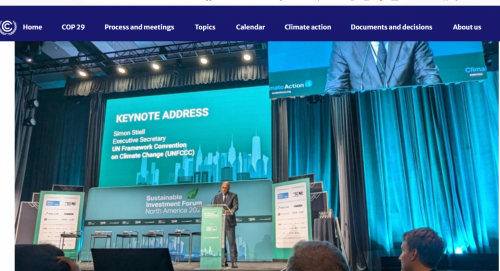
https://unfccc.int/news/decarbonization-is-the-biggest-transformation-of...
First, I’d like to thank Nick Henry and Eric Usher for inviting me to speak here with all of you today.
So many of you in this room are leaders.
On the one hand - this makes sense - early movers reap the biggest rewards.
Decarbonization is inevitable and is the biggest transformation of the global economy of this century. Which makes climate action a very, very smart thing.
But on the other, what you’re doing is not easy. It’s not easy at all.
I know that you’re faced with many headwinds - inconsistent or ambiguous policy settings, high interest rates, supply challenges, to name but a few.
I don’t want to just come here and add another layer of complexity. I want to get down to business. To focus on outcomes and solutions.
On what it will take to seize monumental opportunities in clean energy and infrastructure and curtail spiralling climate costs.
I’ll start with the former.
Financial flows to climate action are already estimated to be over a trillion dollars.
This year alone, investment in solar PV is set to grow to more than $500 billion. More money is now going into solar than all other electricity generation technologies combined. We’re not talking about alternative energy or alternative anything anymore.
And the investment opportunity isn’t just in solar and wind. Look around this room and I see a series of climate choices. Where to build, what materials to use, how to heat and cool all of us in here, how to be resilient to stronger storms.
Transformation is needed in every sector, and that spells opportunity in every sector.
But - and it’s a big but - right now, the vast majority of this money is flowing to projects in the biggest economies. This clean energy mega-trend is progressing unevenly.
On one level – this is understandable – there’s a lot of energy demand and a lot of emissions to reduce. The progress you are making across North American markets is very encouraging and very welcome.
But on another level – it means there are gigantic, unrealized opportunities everywhere else, which most investors are still missing out on.
And I’ll be blunt: if more developing countries don’t see more of this growing deluge of climate investment, we will quickly entrench a dangerous two-speed global transition.
In the faster lanes, businesses in the well-capitalized global north reaping huge profits as the transition gathers pace and scale.
Or - increasingly - acceleration in some major developing economies - which are driving much of their own investment.
In stark contrast, many other developing countries are striving to pick up the pace, but are hamstrung by sky-high costs of capital, often based on outdated or ill-founded perceptions around risk in these markets, or mired in spiralling debt crises.
The injustice and imbalance is not only unacceptable, it is self-defeating - for every economy.
Firstly, because it will make it near impossible to halve global emissions by 2030, on the way to net-zero, without which no economy - including the largest - can survive the rising climate carnage.
Secondly, because supply chains are interdependent. And our economic systems are being increasingly disrupted. Consider the severe droughts and fires wiping out food production across key regions, or slowing shipping traffic to a crawl in key corridors.
We saw what covid did to supply chains, causing spiralling business costs and inflation for consumers, and work for central banks.
Well, this will seem like a minor hiccup compared to what an unchecked climate crisis will inflict, especially if we don’t get more investment flowing into more climate-resilient supply chains.
For all the recent talks of deglobalization or nearshoring our world and our global economy is interdependent. And if a two-speed global transition sets in, ultimately everyone loses, and loses badly.
The good news is we know the solutions that are needed.
We need a new climate finance deal. I say deal deliberately because this isn’t just about a figure for how much public finance we need. It’s a commitment to get funds flowing now. From more sources. Public and concessional finance yes, but also blended finance, enabled by serious reforms of development banks and much stronger climate policies by governments.
Serious progress is needed urgently, both at climate negotiations in Baku this year and by G20 ministers who are shareholders in the big development banks.
In every report about the scale of opportunity and need for climate action across the developing world, there's usually a big part of the graph marked “private sector.” But we need to be honest about what the private sector can do now and in the future.
I want to hear from you today not just about the barriers, but what are your ideas to overcome them by working together.
Clearly governments must play a leading role.
The new national climate plans due early next year – which we call NDCs - will be among the most important policy documents produced so far this century, as will adaptation plans.
Collectively, you have incredible power to open policymakers’ doors right around the world.
Your pressure can be felt. Your advocacy has never been more essential, making the case to governments about why it’s entirely in their interests to step up their climate actions and put together stronger plans and stronger policies to support them.
You all have a crucial role in ensuring government send more investment greenlight signals.
The reality is - as global competition on climate action heats up - amber signals or worse are simply ceding massive economic and commercial opportunities to investors and firms from other countries.
So I urge you - use your voice and make it heard. Let governments know that you’re ready to seize these massive opportunities, not tomorrow but now.
I thank you.









